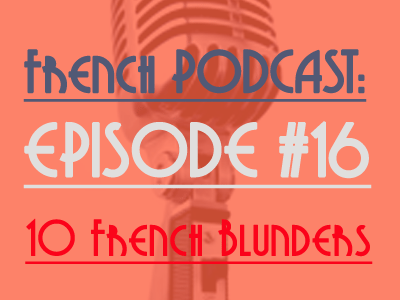Bonjour, this is Frederic and I would like to personally welcome you to the sixteenth episode of the Talk in French Podcast!
This podcast is intended for beginner to intermediate French language learners and French culture enthusiasts. For advanced level learners, I also have an all-French Podcast which you would probably enjoy more. You can check the Advanced Podcast here.
In this episode:
- Some information about French Culture. I explain about Bastille Day and why it is not what you think it is. I also share my view on why we should not celebrate this day.
- Some French Words with an English Translation. Ideal when you cook, run, commute...
- A quick French Grammar Explanation. 10 false cognate and blunders make by English Speakers
- Some French Expressions and their translation

What's in this Podcast?
French Travel and Culture
Discover some interesting aspects of French travel and culture.
Vocabulary and Expressions
Learn useful French vocabulary and idiomatic expressions.
French Grammar Explanation
Get to know important grammar points and learn how to use it.
Listen to this Podcast Episode Now
French Vocabulary Included in this Episode:
| la tarte | pie |
| le gâteau aux carottes | carrot cake |
| le gâteau au fromage | cheesecake |
| les bonbons | candy |
| les biscuits | cookies |
| la crème anglaise | custard |
| la crême glacée | ice cream |
| les croissants au beurre | butter croissants |
| la tarte aux pommes | apple pie |
| les gaufres | waffles |
French Expressions from this Podcast Episode:
| C'est douteux | It's doubtful |
| Il ne s'est jamais mieux porté. | He's never been better. |
| Je t'y prends ! | I've got you! |
| Que faire ? | What is to be done? |
| Rien à faire | It's hopeless |
10 blunders (listen the podcast for more details):
Actuellement vs Actually
Actuellement = "at the present time".
Actuall y= "in fact" = en fait
Assister vs Assist
Assister = to attend something
To assist = aider
Attendre vs Attend
Attendre = to wait for:
To attend = see above
Caractère vs Character
Caractère = character or temperament of a person or thing:
Character = can also means this in english but it can be = un personnage.
Collège vs College
Le collège = junior high school / middle school
College (english) = université
Éventuellement vs Eventually
Éventuellement = possibly, if need be, or even
Eventually = finalement / tôt ou tard.
Finalement vs Finally
Finalement = eventually or in the end
Finally = enfin or en dernier lieu.
Gros vs Gross
Gros =s big, fat, heavy, or serious:
Gross means grossier, fruste, or (informally) dégueulasse.
Librairie vs Library
Une librairie refers = a bookstore
Library =une bibliothèque.
Réaliser vs Realize
Réaliser means to fulfill (a dream or aspiration) or achieve. To realize means se rendre compte de, prendre conscience de, or comprendre.
Rester vs Rest
Rester = to stay or remain
To rest= se reposer
Especially / en particulier
Anglicisme. Ly = ment (e.g: parfaitement = perfectly). But especiallement does not exist in French.
Fameux= famous
Fameux means famous. But it is rarely for someone or a place. We prefer to use the word connu (well-know) or célèbre . Fameux is a bit old fashion but you can use it in literature.
Listen the french grammar point for more information.
Links to Articles and Resources Mentioned in this Episode:
Also on iTunes
This podcast is also available on iTunes, so if you prefer to listen on your device, please check it out on iTunes and give me an honest review here . I updated the RSS feed so all the information is available there.
Once again your feedback will be greatly appreciated and it would help me develop more learning resources for you. If you have time, please leave a review in iTunes, too.
Still Stuck at Intermediate French?

Break through the plateau with our proven coaching and study method.
Salut, Frédéric.
J’ai une question au sujet des faux amis. Dans cet épisode, tu as dit que le mot «fameux» n’est pas utilisé comme l’anglais «famous», sauf pour décrire la nourriture. Mais dans la chanson folklorique «L’Auberge de l’écu», le premier verset se lit comme «Dans notre ville est venu * un fameux jouer de luth». Évidemment un jouer de luth n’est pas un comestible. Est-ce un exemple d’utilisation archaïque, ou est-il une traduction différente en anglais du mot «fameux» dans ce contexte?
Merci pour ta réponse.
-Juan
Ah la bonne question, oui effectivement fameux est ici l’équivalent de “famous” mais comme tu le dis, c’est une utilisation un peu archaïque. On utilise beaucoup plus le mot fameux à l’écrit qu’à l’oral ou alors dans un sens ironique.